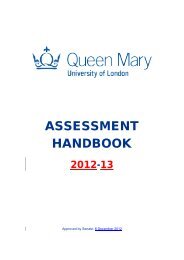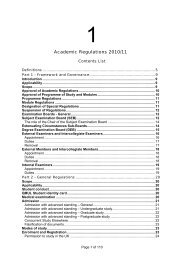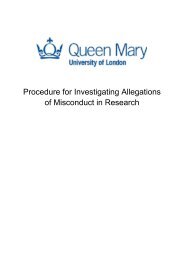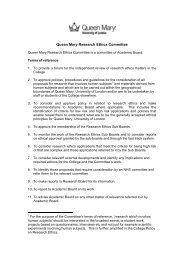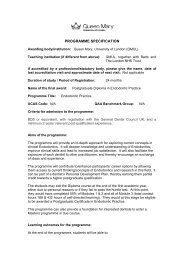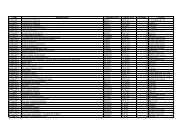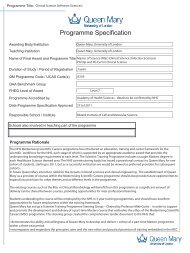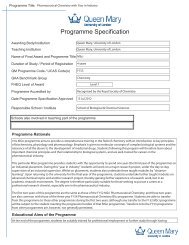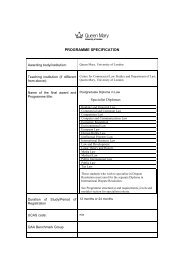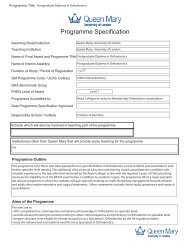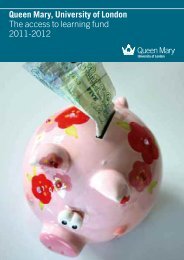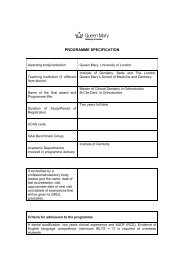- Page 1 and 2:
Taught Programmes Board A meeting o
- Page 3 and 4:
The next meeting is Tuesday 29 th J
- Page 5 and 6:
i. The non-standard duration for th
- Page 7 and 8:
was primarily to assure equivalence
- Page 9 and 10:
Module Withdrawals 2012-010 The Boa
- Page 11 and 12:
TPB2012-013 Taught Programmes Board
- Page 13 and 14:
TPB2012-014 Paper Title Outcome req
- Page 15 and 16:
TPB2012-014 ii. Reduce the number o
- Page 17 and 18:
Taught Programmes Board TPB2012-015
- Page 19 and 20:
Taught Programmes Board TPB2012-015
- Page 21 and 22:
Taught Programmes Board TPB2012-015
- Page 23 and 24:
TPB2012-015 Programme Title: Master
- Page 25 and 26:
TPB2012-015 Programme Title: Master
- Page 27 and 28:
TPB2012-015 Programme Title: Master
- Page 29 and 30:
TPB2012-015 Module Proposal Form Se
- Page 31 and 32:
TPB2012-015 Section 2 - Module Spec
- Page 33 and 34:
TPB2012-015 Press. Hood, C, Scott,
- Page 35 and 36:
TPB2012-015 Module Proposal Form Se
- Page 37 and 38:
TPB2012-015 Section 2 - Module Spec
- Page 39 and 40:
TPB2012-015 Teaching and Learning P
- Page 41 and 42:
TPB2012-015 Module Proposal Form Se
- Page 43 and 44:
TPB2012-015 Section 2 - Module Spec
- Page 45 and 46:
TPB2012-015 Haslam, C and Mariott,
- Page 47 and 48:
TPB2012-015
- Page 49 and 50:
TPB2012-015 Module Rationale Provid
- Page 51 and 52:
TPB2012-015 3) Learning Outcomes Id
- Page 53 and 54:
TPB2012-015 Longer analytical essay
- Page 55 and 56:
TPB2012-015 Module Rationale Provid
- Page 57 and 58:
TPB2012-015 3) Learning Outcomes Id
- Page 59 and 60:
TPB2012-015 Student assessment will
- Page 61 and 62:
TPB2012-015 Module Proposal Form Se
- Page 63 and 64:
TPB2012-015 Section 2 - Module Spec
- Page 65 and 66:
TPB2012-015 Oxford: Oxford Universi
- Page 67 and 68:
TPB2012-015 Module Proposal Form Se
- Page 69 and 70:
TPB2012-015 Section 2 - Module Spec
- Page 71 and 72:
TPB2012-015 Teaching and Learning P
- Page 73 and 74:
TPB2012-015 Module Proposal Form Se
- Page 75 and 76:
TPB2012-015 Section 2 - Module Spec
- Page 77 and 78:
TPB2012-015 Teaching and Learning P
- Page 79 and 80:
TPB2012-016 Taught Programmes Board
- Page 81 and 82:
Taught Programmes Board TPB2012-016
- Page 83 and 84:
Taught Programmes Board TPB2012-016
- Page 85 and 86:
Taught Programmes Board TPB2012-016
- Page 87 and 88:
TPB2012-016 Programme Title: MSc Ac
- Page 89 and 90:
TPB2012-016 Programme Title: MSc Ac
- Page 91 and 92:
TPB2012-016 Programme Title: MSc Ac
- Page 93 and 94:
TPB2012-016 Module Rationale Provid
- Page 95 and 96:
TPB2012-016 3) Learning Outcomes Id
- Page 97 and 98:
TPB2012-016 Reassessment Provide de
- Page 99 and 100:
TPB2012-016 Module Rationale Provid
- Page 101 and 102:
TPB2012-016 3) Learning Outcomes Id
- Page 103 and 104:
TPB2012-016 Reassessment Provide de
- Page 105 and 106:
TPB2012-016 Module Rationale Provid
- Page 107 and 108:
TPB2012-016 3) Learning Outcomes Id
- Page 109 and 110:
TPB2012-016 Note: The Qualifying Ma
- Page 111 and 112:
Taught Programmes Board TPB2012-017
- Page 113 and 114:
Taught Programmes Board TPB2012-017
- Page 115 and 116:
TPB2012-017 Programme Title: MSc Ma
- Page 117 and 118:
TPB2012-017 Programme Title: MSc Ma
- Page 119 and 120:
TPB2012-017 Programme Title: MSc Ma
- Page 121 and 122:
TPB2012-018 Taught Programmes Board
- Page 123 and 124:
Taught Programmes Board TPB2012-018
- Page 125 and 126:
Taught Programmes Board TPB2012-018
- Page 127 and 128:
TPB2012-018 Programme Title: MSc In
- Page 129 and 130:
TPB2012-018 Programme Title: MSc In
- Page 131 and 132:
TPB2012-018 Programme Title: MSc In
- Page 133 and 134:
TPB2012-018 Module Proposal Form Se
- Page 135 and 136:
TPB2012-018 Section 2 - Module Spec
- Page 137 and 138:
TPB2012-018 Global Governance Journ
- Page 139 and 140:
TPB2012-019 Taught Programmes Board
- Page 141 and 142:
Taught Programmes Board TPB2012-019
- Page 143 and 144:
TPB2012-019 Programme Title: Three-
- Page 145 and 146:
TPB2012-019 Programme Title: Three-
- Page 147 and 148:
TPB2012-019 Programme Title: Three-
- Page 149 and 150:
TPB2012-019 Programme Title: Three-
- Page 151 and 152:
TPB2012-019 Module Rationale Provid
- Page 153 and 154:
TPB2012-019 3) Learning Outcomes Id
- Page 155 and 156:
TPB2012-019 Description of Assessme
- Page 157 and 158:
TPB2012-019 Module Proposal Form (U
- Page 159 and 160:
TPB2012-019 Section 2 - Module Spec
- Page 161 and 162:
TPB2012-019 Teaching and Learning P
- Page 163 and 164:
TPB2012-020 Taught Programmes Board
- Page 165 and 166:
Taught Programmes Board TPB2012-020
- Page 167 and 168:
Taught Programmes Board TPB2012-020
- Page 169 and 170:
TPB2012-021
- Page 171 and 172:
TPB2012-021
- Page 173 and 174:
TPB2012-022 Taught Programmes Board
- Page 175 and 176:
TPB2012-022 Module Rationale Provid
- Page 177 and 178:
TPB2012-022 To apply guidelines on
- Page 179 and 180:
TPB2012-022 C 5 C 6 C 7 Take respon
- Page 181 and 182:
TPB2012-022 Human Health Disease :
- Page 183 and 184:
TPB2012-022 Module Proposal Form (U
- Page 185 and 186:
TPB2012-022 Section 2 - Module Spec
- Page 187 and 188:
TPB2012-022 Disciplinary Skills - a
- Page 189 and 190:
TPB2012-022 Teaching and Learning P
- Page 191 and 192:
TPB2012-022
- Page 193 and 194:
TPB2012-022 Module Rationale Provid
- Page 195 and 196:
TPB2012-022 3) Learning Outcomes Id
- Page 197 and 198:
TPB2012-022 C 3 C 4 C 5 C 6 C 7 C 8
- Page 199 and 200:
TPB2012-022 Coursework 8: Project/E
- Page 201 and 202:
TPB2012-022 Module Rationale Provid
- Page 203 and 204:
TPB2012-022 3) Learning Outcomes Id
- Page 205 and 206:
TPB2012-022 C 4 C 5 C 6 C 7 Partici
- Page 207 and 208:
TPB2012-022 Section 3 - Alternative
- Page 209 and 210:
TPB2012-023 Module Amendment accept
- Page 211 and 212:
TPB2012-023 Module Amendment accept
- Page 213 and 214:
TPB2012-023 Module Amendment accept
- Page 215 and 216:
TPB2012-024 University of London In
- Page 217 and 218:
TPB2012-024 University of London In
- Page 219 and 220:
TPB2012-024 7 All University of Lon
- Page 221 and 222:
TPB2012-024 Lead College Deleted: C
- Page 223 and 224:
TPB2012-024 To progress from the Po
- Page 225 and 226:
TPB2012-024 English language profic
- Page 227 and 228:
TPB2012-024 Transferable skills A s
- Page 229 and 230:
TPB2012-024 Annual programme re
- Page 231 and 232:
TPB2012-024 1.10 A student who prog
- Page 233 and 234:
TPB2012-024 2 Credit transfer and a
- Page 235 and 236:
TPB2012-024 A student whose date o
- Page 237 and 238:
TPB2012-024 4.3 Jurisprudence and l
- Page 239 and 240:
TPB2012-024 4.25 Statutes and other
- Page 241 and 242:
TPB2012-024 5.3 (GR) A student who
- Page 243 and 244:
TPB2012-024 summarised, students mu
- Page 245 and 246:
TPB2012-024 7.16 Notwithstanding Re
- Page 247 and 248:
TPB2012-024 Requirements for the aw
- Page 249 and 250:
TPB2012-024 9.12 A student whose re
- Page 251 and 252:
TPB2012-024 In the event that a dec
- Page 253 and 254:
TPB2012-024 11.15 A student enrolli
- Page 255 and 256:
TPB2012-024 Appendix A - Syllabuses
- Page 257 and 258:
TPB2012-024 The distinctive fe
- Page 259 and 260:
TPB2012-024 Module B [LWM05B] Seque
- Page 261 and 262:
TPB2012-024 Investment of trust fun
- Page 263 and 264:
TPB2012-024 Module D [LWM09D] Seque
- Page 265 and 266:
TPB2012-024 The right to life Th
- Page 267 and 268:
TPB2012-024 Environmental protec
- Page 269 and 270:
TPB2012-024 The welfare principle
- Page 271 and 272:
TPB2012-024 Freedom of the press
- Page 273 and 274:
TPB2012-024 History and introduc
- Page 275 and 276:
TPB2012-024 Construing the terms o
- Page 277 and 278:
TPB2012-024 Emerging copyright is
- Page 279 and 280:
TPB2012-024 Infringement and limit
- Page 281 and 282:
TPB2012-024 Module C [LWM28C] Seque
- Page 283 and 284:
TPB2012-024 Module D [LWM29D] Seque
- Page 285 and 286:
TPB2012-024 Module A [LWM31A] Evolu
- Page 287 and 288: TPB2012-024 Fleshing out of the
- Page 289 and 290: TPB2012-024 Introduction to merger
- Page 291 and 292: TPB2012-024 o o o o o o o Principle
- Page 293 and 294: TPB2012-024 Modern legal theory Se
- Page 295 and 296: TPB2012-024 The objectives of the
- Page 297 and 298: TPB2012-024 Technical aspects o
- Page 299 and 300: TPB2012-024 The legal nature of
- Page 301 and 302: TPB2012-024 Sequence: module A, B a
- Page 303 and 304: TPB2012-024 The rules and restrict
- Page 305 and 306: TPB2012-024 (not yet available - th
- Page 307 and 308: TPB2012-024 Sequence: module A must
- Page 309 and 310: TPB2012-024 Foreign element VAT T
- Page 311 and 312: TPB2012-024 Due diligence searches
- Page 313 and 314: TPB2012-024 o o o Andorra, San Mari
- Page 315 and 316: TPB2012-024 Appendix B - List of co
- Page 317 and 318: TPB2012-024 [LWM19B] Feminist criti
- Page 319 and 320: TPB2012-024 [LWM34D] The high seas,
- Page 321 and 322: TPB2012-024 [LWM48A] The purpose an
- Page 323 and 324: TPB2012-024 Law on investment enti
- Page 325 and 326: TPB2012-024 Transfer of technology
- Page 327 and 328: TPB2012-024 External relations law
- Page 329 and 330: TPB2012-024 International commerci
- Page 331 and 332: TPB2012-024 Multinational enterpri
- Page 333 and 334: TPB2012-024 Sports law Students sho
- Page 335 and 336: TPB2012-024 Transfer, enrolment and
- Page 337: TPB2012-024 Appendix E - Scheme of
- Page 341 and 342: TPB2012-024 that assessment is, and
- Page 343 and 344: TPB2012-024 A student who is regist
- Page 345 and 346: TPB2012-024 The University will iss
- Page 347 and 348: TPB2012-024 See: http://www.londoni
- Page 349 and 350: TPB2012-024 Important information r
- Page 351 and 352: TPB2012-024 Summary of provision fo
- Page 353 and 354: TPB2012-024 Internet access All stu
- Page 355 and 356: TPB2012-024 The Alumni Association
- Page 357 and 358: TPB2012-024 2 Registration Period o
- Page 359 and 360: TPB2012-024 3.10 (GR) Examinations
- Page 361 and 362: TPB2012-024 3.32 (GR) Calculators w
- Page 363 and 364: TPB2012-024 4.8 (GR) The result awa
- Page 365 and 366: TPB2012-024 Non-credit bearing modu
- Page 367 and 368: TPB2012-024 Programme Specification
- Page 369 and 370: TPB2012-024 Appendix A - Syllabus o
- Page 371 and 372: TPB2012-024 The distinctive fe
- Page 373 and 374: TPB2012-024 Module B [LWM05B] Seque
- Page 375 and 376: TPB2012-024 Investment of trust fun
- Page 377 and 378: TPB2012-024 Module D [LWM09D] Seque
- Page 379 and 380: TPB2012-024 The right to life Th
- Page 381 and 382: TPB2012-024 Environmental protec
- Page 383 and 384: TPB2012-024 The welfare principle
- Page 385 and 386: TPB2012-024 Freedom of the press
- Page 387 and 388: TPB2012-024 History and introduc
- Page 389 and 390:
TPB2012-024 Construing the terms o
- Page 391 and 392:
TPB2012-024 Emerging copyright is
- Page 393 and 394:
TPB2012-024 Infringement and limit
- Page 395 and 396:
TPB2012-024 Module C [LWM28C] Seque
- Page 397 and 398:
TPB2012-024 Module D [LWM29D] Seque
- Page 399 and 400:
TPB2012-024 Module A [LWM31A] Evolu
- Page 401 and 402:
TPB2012-024 Fleshing out of the
- Page 403 and 404:
TPB2012-024 Introduction to merger
- Page 405 and 406:
TPB2012-024 o o o o o o o Principle
- Page 407 and 408:
TPB2012-024 Modern legal theory Se
- Page 409 and 410:
TPB2012-024 The objectives of
- Page 411 and 412:
TPB2012-024 Technical aspects o
- Page 413 and 414:
TPB2012-024 The legal nature of in
- Page 415 and 416:
TPB2012-024 Sequence: module A, B a
- Page 417 and 418:
TPB2012-024 The rules and restrict
- Page 419 and 420:
TPB2012-024 (not yet available - th
- Page 421 and 422:
TPB2012-024 Sequence: module A must
- Page 423 and 424:
TPB2012-024 Foreign element VAT T
- Page 425 and 426:
TPB2012-024 Due diligence searches
- Page 427 and 428:
TPB2012-024 o o o Andorra, San Mari
- Page 429 and 430:
TPB2012-024 Appendix B - List of co
- Page 431 and 432:
TPB2012-024 [LWM19B] Feminist criti
- Page 433 and 434:
TPB2012-024 [LWM34D] The high seas,
- Page 435 and 436:
TPB2012-024 [LWM48A] The purpose an
- Page 437 and 438:
TPB2012-024 Glossary of terms A, B,
- Page 439 and 440:
TPB2012-024 registration is calcula
- Page 441 and 442:
TPB2012-024 Programme Specification
- Page 443 and 444:
TPB2012-024 Related documents and o
- Page 445 and 446:
TPB2012-024 Annex A - List of indiv
- Page 447 and 448:
TPB2012-024 European Union competit
- Page 449 and 450:
TPB2012-024 International and compa
- Page 451 and 452:
TPB2012-024 International trade law
- Page 453 and 454:
TPB2012-024 Russian civil and comme
- Page 455 and 456:
TPB2012-025 Taught Programmes Board
- Page 457 and 458:
TPB2012-025 Approval Body School/In



